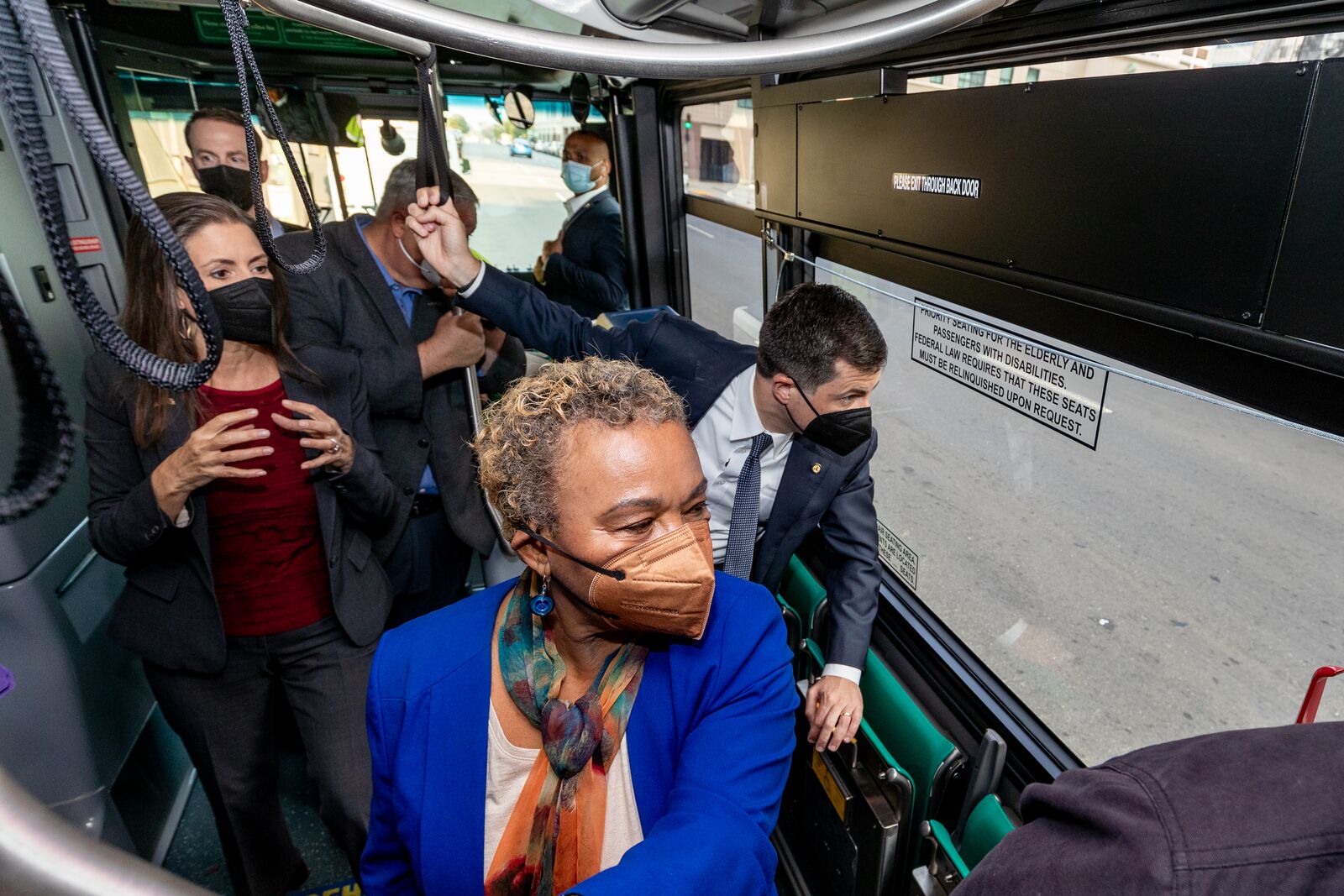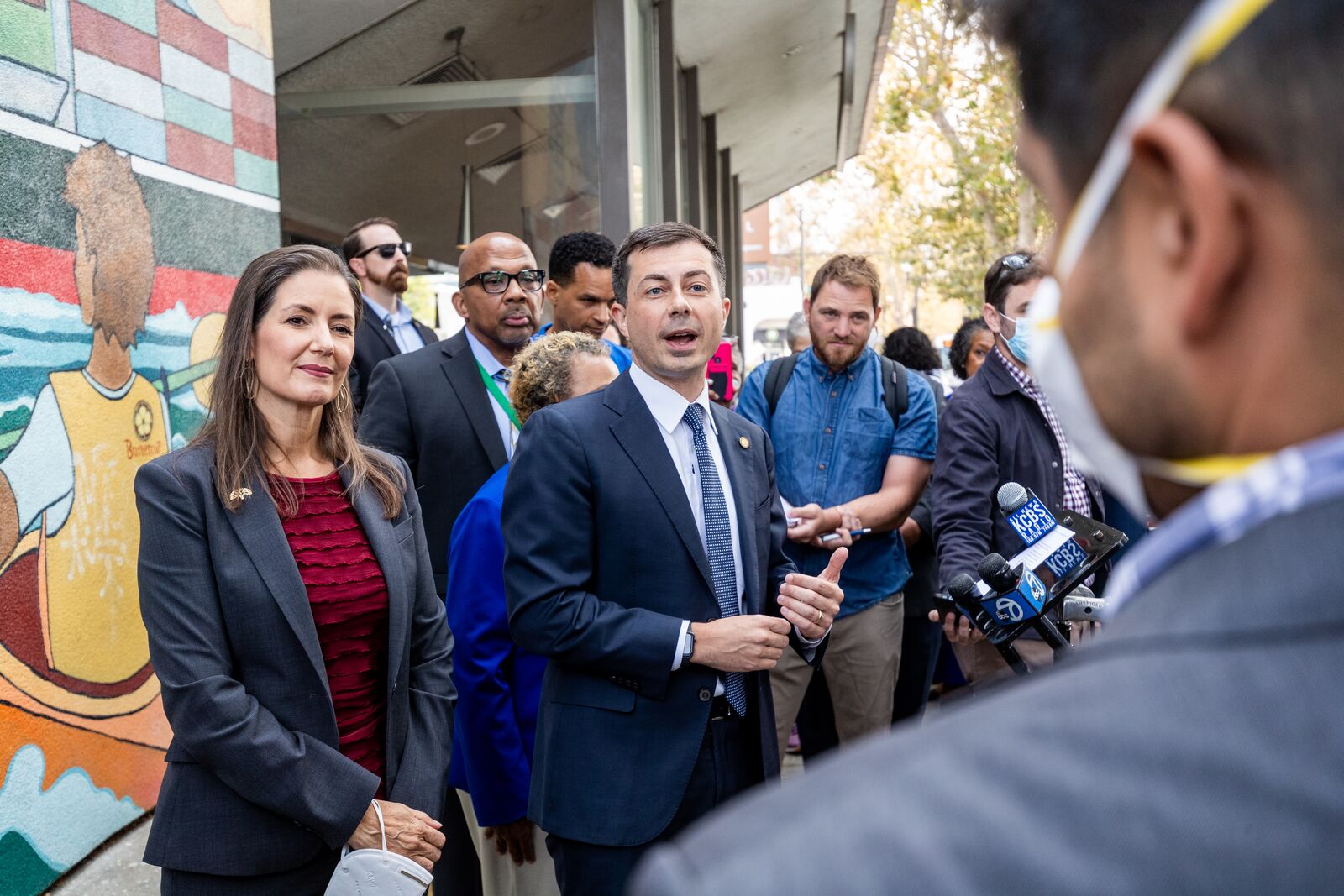US Transportation Secretary Pete Buttigieg was given a view of Oakland’s stark disparities during an infrastructure tour last Friday. He and a group that included Congresswoman Barbara Lee, Oakland Mayor Libby Schaaf, and new Oakland Transportation Director Fred Kelley toured the city’s thriving downtown area and Jack London Square along with a historically segregated West Oakland neighborhood that continues to suffer from more collisions.
“Safety is an example of the racial and economic injustice that has been part of transportation,” Buttigieg told The Oaklandside on Friday. “It’s been part of every aspect of society, policy, life, and the economy in the United States. And so when we are making an investment in equitable improvements to transportation, that includes a recognition of safety outcomes.”
Buttigieg acknowledged that Black and brown pedestrians are more likely to lose their lives by virtue of being in environments that are “overburdened and underserved.” “[That condition] does not have to remain…the federal grant [given to Oakland] is a way to enhance that kind of equity and deliver safety where it has not been equitable,” Buttigieg said.
Friday’s stop was part of a trip by Buttigieg to infrastructure developments nationwide. Oakland was one of the dozens of municipalities nationwide to receive funding from the Federal Rebuilding America Infrastructure with Sustainability and Equity (RAISE) program last year. RAISE has awarded close to $4 billion since 2009 to local and state governments. With the Biden administration’s $1.4 billion in infrastructure subsidies starting to trickle out, Oakland and other cities will soon be asking the federal government for more money.
“We are gonna to be able to say yes to more transit agencies and mayors than ever before,” Buttigieg said.

One of the big projects on the horizon that could benefit from federal attention is the potential removal of the I-980 freeway, which cuts off West Oakland from downtown and the rest of the city.
During Friday’s tour, Congresswoman Lee discussed how the I-980 affected Oakland’s Black community, cutting it off from downtown investment and opportunity for generations. When the AC Transit bus carrying the politicians stopped at the 12th Street Bridge overlooking the I-980, Buttigieg peered out from the windows as Schaaf noted that the freeway’s possible “undergrounding, closure, bridge, [or] conversion” is an opportunity for reinvestment.
“It is one of the more underutilized and unnecessary freeways in this country,” Schaaf said.
“We saw a dramatic example of the consequence of highway construction from the previous generation,” Buttigieg said later in the day when discussing the freeway. “It was a literal gash in the neighborhood…knowing that those who were displaced were never fully made whole. but there are opportunities now to make right what was wrong.”
A redeveloped I-980 freeway could open up seven acres of land, according to early studies.
Preliminary designs for possible development at that location have placed possible apartment buildings or a long strip of parkland, similar to the greenside panhandle abutting San Francisco’s Golden Gate Park. But no plan has been approved to take it down, and it is for now only part of a bigger unfunded wishlist of very expensive infrastructure projects. Not everyone wants the freeway to be taken down. Retired UC Berkeley regional planner Mal Hadley said on Twitter that “it seems like a nonstarter.” “You cannot have thousand of folk driving through city streets to get everywhere. [The 580 and 13 freeways] also divide the city,” she said.
The Reconnecting the Town project is already having an impact. It includes adding bus-only lanes near the city’s Old Oakland neighborhood and, over the next two years, will significantly change Broadway Avenue and Martin Luther King Jr. Way.
Broadway’s main development will have its current bus lanes, which now end before the 880 freeway overpass, extended to West Embarcadero Avenue. And MLK will receive either buffered or protected bike lanes from San Pablo Avenue to West Embarcadero.
Both streets are expected to receive widened sidewalks and brighter lights. Intersections will be improved with new ADA access designs and bulb-outs to shorten crossing distances. “I know that this [Biden] administration wants to heal connections, create those connections for equity, climate change, and jobs,” Schaaf said.

Since the department’s inception in 2016, OakDOT has focused on creating what it calls an “equity-first” mindset when choosing which projects to build. Mainly, it uses an equity tool that serves as a scorecard measuring how much infrastructure help historically-underfunded communities need to make street conditions safer. After decades of inaction in East and West Oakland, the Black, brown, and Asian communities there have suffered more deadly crashes than others.
According to city data, Black residents are twice as likely to be killed or severely injured in a car crash than others, and three times more likely to be killed or injured while walking. As the Oaklandside has also reported, the city sees more senior and child collision injuries, red-light car running, and dangerous speeding than other comparable cities. A small contingent of protesters also gave Buttigieg a taste of the city’s lively tradition of dissent.
About eight people, including retired carpenter and mayoral candidate Jon Reimann, implored Buttigieg, Lee, and Schaaf to stop any funding that would help Oakland A’s owner John Fisher from receiving public funding to build a new stadium at Howard Terminal.
While not directly connected to the stadium plans, the Reconnecting the Town project Buttigieg and company were celebrating will help improve conditions close enough that it could benefit the A’s development.

Nicole Ferrara, OakDOT’s major projects division manager, told reporters Friday that creating a full transit throughway from the middle of the city to the waterfront will better connect AC Transit’s bus service and walking and biking residents to Amtrak rail, BART’s West Oakland station, and the region’s ferry service.
“It’s a great opportunity for regional connections,” she said.
Ferrera also noted that Broadway at 2nd Street, where the press conference was conducted, is part of the city’s high injury network corridor where most city collisions happen.
People that walk on these corridors today, including herself with her family and kids, Ferrara said, “do not feel comfortable.”

